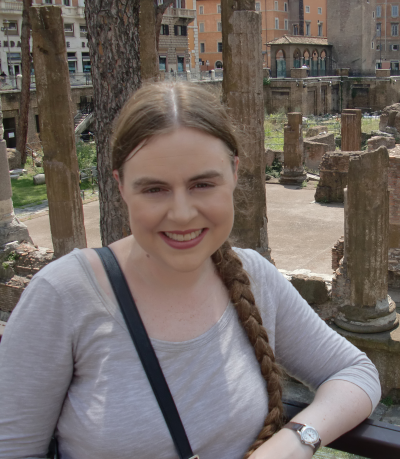This is the first post in a series of interviews conducted by the Woodruff Library with the 2015-2016 Woodruff Library and Emory Center for Digital Scholarship Fellows. Funded by the Laney Graduate School, the Woodruff Library, and Emory Center for Digital Scholarship (ECDS), the fellowships support advanced graduate students expecting to complete their dissertations by the end of the fellowship period. Fellows are placed within the Woodruff Library and ECDS to work in an area related to their subject specialization or interest, culminating in a formal presentation in the Spring.
Woodruff: Tell us a little bit about yourself.
Joanna: My name is Joanna Mundy, and I am a PhD candidate in the Emory Art History Department. I grew up in Cedartown, Georgia, lived in Houston, Texas during undergraduate for four years at Rice University, and lived in Cambridge, England for a year for my Master’s Degree. Through my research I read a lot of Italian archaeological reports, but I also love to read mysteries in my free time. One of the things that I love about Emory and Atlanta are the resources available in ancient art. The Carlos Museum, art lectures, and library resources at Emory make Atlanta a wonderful environment for my research and interests. I also love being able to be in a city with art and cultural opportunities, and yet it is a city that still has a lot of greenery and open spaces. The Emory campus is a wonderful working environment all year.
Woodruff: What are you researching for your dissertation?
Joanna: My dissertation, “Domus and Insulae in the City of Rome: Living Spaces, Design, and Development,” explores the architectural design and artistic decoration of different types of urban Roman houses, domus, insulae, and horti, in the city of Rome from the 1st to 5th century CE. The social structure of the household determines which members interact in the different types of spaces in their daily lives, and I pose that in ancient Rome residents constructed and arranged their residences to reinforce the social structure of the household. I am interpreting this domestic social organization from the architectural form, artistic decoration, and layout of Roman domestic properties. Then, using information on known religious, political, and familial affiliations, I am examining the relationships between these households using network analysis and digital mapping. I aim to help determine the role of the house as a constructed social environment in the process of building relationships in Rome.
Woodruff: What interested you about the Woodruff Library/ECDS Fellowship?
Joanna: I worked in the Emory Visual Resources Library for three years, and have worked as a Research Assistant for both the Tracking Samothrace and Virtual Rome projects. I was able to go work on site in Samothrace, Greece, summer 2015, to expand my knowledge of the site and research there. I had the opportunity in 2013 to act as the Andrew W. Mellon Summer Intern for the M. C. Carlos Museum on the Virtual Rome digital project. Through these experiences I have developed skills and furthered my interest in archival work and digital research. My work has kept me aware of the multiple stimulating projects constantly progressing in the Emory Center for Digital Scholarship. When I saw there was a fellowship opportunity, I was excited to get more involved.
Woodruff: What will you be working on this year for your Woodruff Library/ECDS Fellowship?
Joanna: Through the Emory Center for Digital Scholarship, Beck Foundation Fellowship, I will be assisting in the creation and maintenance of different aspects of multiple digital humanities research projects. I feel extremely fortunate to have the opportunity to learn and use new technological skills through this fellowship. During my time in the library, I am learning how to create open source databases, working with the interaction of databases and digital mapping, and working with network analysis software such as Gephi and Cytoscape. I look forward to working on more projects and interacting with the library staff throughout the year.

